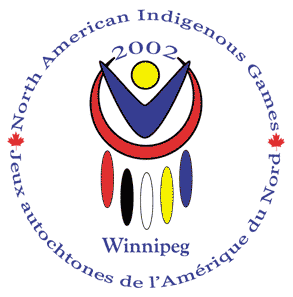|
| |
|
 |
2002 NORTH AMERICAN INDIGENOUS GAMES
JULY 25 TO AUGUST 04, 2002
WINNIPEG-MANITOBA-CANADA
NAIG
TAEKWONDO COMPETITION
|
 |
2002 North American Indigenous Games
For thousands of years, Aboriginal people have held games
across North America. Historical records show many modern sports were derived
from traditional indigenous games. What is not well known, is that these early
games taught personal and social values and traditional ceremonies; the
curriculum for their way of life. Today’s modern games continues the practice
of teaching each generation the values and qualities so important for meeting
the responsibilities of adulthood. July 25–August 4, Winnipeg will host the
2002 North American Indigenous Games; an Aboriginal multi-sport and cultural
celebration anticipated to be the largest gathering of its kind in Canadian
history. Sixteen different sports, three traditional Aboriginal and 13
non-traditional, will draw up to 7,000 First Nation, Métis, Inuit and Native
American participants ranging in age from 13 years to adult and including
participants with disabilities. Up to 3,000 cultural performers will entertain
and educate throughout the games. To learn more about the games, to volunteer
or to catch the wave of activity building around the games, call the Games
Host Society at 927-2002 or visit the Game’s website at
www.2002naig.com.
|
THE
NAIG TAE KWON DO COMPETITION
July 30-31, 2002
The North
American Indigenous Games (NAIG), promise to be one of the biggest sport
event ever host in Winnipeg, it will be even bigger than the Pan American
Games. Tae Kwon Do will be one of the sport on this event, and we hope all
Taekwondo practitioners and fans will support this event as spectators,
competitors or as a volunteers.
|
|
WEIGHT
CATEGORY |
JUNIOR DIVISION
13,14,15 years old |
SENIOR DIVISION
16 years and older |
|
MALE |
FEMALE |
| FINWEIGHT |
45 kg or
Under |
42 kg or
Under |
|
| FLYWEIGHT |
+45 kg - 48 kg |
+42 kg - 44 kg |
|
| BANTAMWEIGHT |
+48 kg - 51 kg |
+44 kg - 46 kg |
|
| FEATHERWEIGHT |
+51 kg - 55 kg |
+46 kg
- 49 kg |
|
| LIGHTWEIGHT |
+55 kg - 59 kg |
+49 kg
- 52 kg |
|
| WELTERWEIGHT |
+59 kg - 63 kg |
+52 kg
- 55 kg |
|
| MIDDLEWEIGHT |
+63 kg - 73 kg |
+55 kg
- 63 kg |
|
| HEAVYWEIGHT |
Over 73kg |
Over 63
kg |
|
Color Belts Competition:
- Sparring preliminaries shall consist of two
(2) rounds of one and a half (1.5) minutes.
- Sparring final shall follow the same format.
- A rest interval of thirty (30) seconds shall be allocated between bouts.
Black Belts Competition:
- Sparring preliminary shall consist of two
(2) rounds of two (2) minutes.
- Sparring final bout shall be three (3) rounds of two (2) minutes.
- A rest interval of one (1) minute shall be allocated between rounds.

Below you will found some
terminology which may help you to understand better the competition :
Alert line : The unmarked line on the mat
one metre inside the marginal line of the Contest Area which reminds the
contestants not to cross the boundary line. The colour of the mat in this one-metre
wide border is different from that of the remaining part of the Contest Area.
Boundary line : The unmarked marginal line
around the outside of the Contest Area, defining the outer edge of the mat.
Cha-ryeot : The referee's command to adopt a
position of attention.
Chung : The contestant wearing blue.
Contest area : A 12-metre square in the
centre of the mat where a taekwondo contest is conducted.
Deuk-jeom : A point.
Gam-jeom : A penalty that automatically
costs a contestant a point.
Hong : The contestant wearing red.
Joon-bi : The referee's command to get ready
to start the contest.
Kal-yeo : The referee's command to break, or
move away from a downed opponent.
Keu-man : The referee's command to stop the
contest.
Knockdown : The ruling when a contestant is
knocked to the floor, or is deemed unable to continue.
Knockout : A ruling where the referee stops
the contest and declares a contestant the winner if his or her opponent cannot
continue.
Kyeong-rye : The referee's command to bow.
Kye-shi : The referee's command to suspend
the match while a fighter receives first aid.
Kye-sok : The referee's command to continue.
Kyong-go : A warning for violating a rule,
costing half a point but not deducted unless it combines with a previous
warning to make a whole point.
Referee's mark : A marked point on the mat
where the referee begins and ends each round.
Round : One of a series of periods,
separated by rests, making up a match.
Scoring area : The area of the opponent's
face or body where a legitimate strike may be made to score a point.
Shi-gan : The referee's command to suspend
the match for reasons other than medical assistance.
Shi-jak : The referee's command to start the
contest.
Su-bak : A self-defence art practised in
Korea 800 years ago, apparently used as sport to entertain spectators.
Sudden death : A method of resolving a
gold-medal contest in the Olympic Games that has resulted in a tie by playing
a fourth round in which the first person to score is the winner.
Taekwondo : A modern form of martial art
meaning "way of hands and feet" and descended from ancient Korean martial
arts.
Yeo-dul : Eight in Korean, ending the
mandatory eight-count a downed contestant must take even if he wants to resume
sparring.
Yeol : The number ten in Korean, indicating
the end of a full count and, hence, a knockout.
If you need more information please visit the official
website of the North American Indigenous Games at :
http://www.2002naig.com
|

